Past Courses 2016-2017
Spring 2017 Undergraduate Humanities Courses
HUM 220-0-20: Health, Biomedicine, Culture, and Society
(SOCIOL 220-0-20)
Aaron Norton (Sociology)
MW 2:00 - 3:20 pm
Fulfills Distro 3 (Social and Behavioral Sciences), Distro 5 (Ethics and Values), or Interdisciplinary Distro
This course offers a broad overview of the intersections between health, illness, and biomedicine (broadly conceived) in society. Drawing largely on sociological and anthropological frameworks, we will first consider major theoretical approaches to the study of health and illness including how biomedical developments have reshaped what it means to be “healthy” or “sick” over time. We will then consider a series of themes that highlight the intersections of biomedicine, health, and society as they are understood and experienced by patients, doctors, scientists, caregivers, and others. With each topic, we will explore how the individual understandings and felt experience of health and illness are contingent upon cultural and institutional dynamics larger than that of the individual. Broad themes may include topics such as birth, death, sex and gender, risk, race, drugs, disability, mental illness, environmental toxicity, etc. Readings will highlight some of the complex dynamics between biomedicine and society through a particular topic reflecting the theme - for example, breast cancer risk and its treatment; schizophrenia and race; “death” in the U.S. versus Japan; better sex through drugs, and so on. Students will leave the course with a broad understanding of key theoretical perspectives and themes in the social studies of health, illness, and biomedicine.
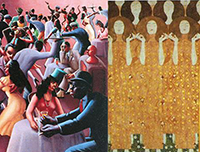 HUM 310-4-20: Charting Modern Cities: Chicago and Vienna
HUM 310-4-20: Charting Modern Cities: Chicago and Vienna
Anna Parkinson (German)
TuTh 2:00 - 3:20 pm
Fulfills Distro 4 (Historical Studies)
How is a city a measure of culture? What do we focus on when studying cities? In this course students will explore the distinctive histories and material cultures of two modern cities: Vienna and Chicago. In Vienna, we will encounter ideas and artworks from the fin-de-siècle Vienna Modern at the heart of Central Europe, through to current political cultures of human rights and migration. In the US-American context, students will trace Chicago’s brand of modernity exemplified in the history of urban planning and architectural styles, as well as domestic and transnational migration’s impact on art and social movements. In tandem with excursions, students will draw on interdisciplinary approaches from urban studies, literary and film studies, sociology, art history, philosophy, psychoanalysis, political science, intellectual history, and architecture as they seek answers through their research to the questions: how is the city constituted as an object of analysis; and how does a city shape—and, simultaneously, is shaped by—its inhabitants?
NOTE: This course includes travel to Vienna, Austria, over Spring Break. Enrollment in this class was by application only. More details are here: http://www.humanities.northwestern.edu/undergraduate/global-humanities-lab/past-global-humanities-lab.html
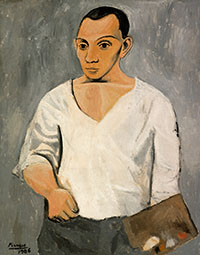 HUM 310-6-22: Picasso
HUM 310-6-22: Picasso
(ART HISTORY 390-0-2)
Christina Kiaer (Art History)
MW 12:30 - 1:50 pm
Fulfills Distro 6 (Literature and Fine Arts)
NOTE: This course includes travel to Madrid, Spain, over Memorial Day weekend. Enrollment in this class was by application only. More details are here: http://www.humanities.northwestern.edu/undergraduate/global-humanities-lab/past-global-humanities-lab.html
The most famous artist of the twentieth century, Picasso is synonymous with the idea of modern art. Examining his work from his early scenes of bohemian Paris to his invention of cubism, his association with the surrealists, his famous protest mural Guernica of 1937, and his later political mural projects, we will ask: What makes Picasso such a powerful sign of the modern, continuously venerated in museums, scholarship and popular culture? This small-group, discussion based seminar will examine both his endlessly inventive formal experimentation—flirting with, but never fully embracing, abstraction—and the continuing resonance, in spite of feminist and postcolonial critiques, of his images of intimacy, interiority, and sexuality, as well as terror and atavistic violence.
HUM 370-4-20: Real Indians: Indigeneity and the Authenticity Problem
(HISTORY 393-0-24 / AMER_ST 310-0-21)
Doug Kiel (History and Humanities)
TuTh 3:30 - 4:50 pm
Fulfills Distro 4 (Historical Studies)
In settler societies, Indigenous peoples must be recognized by the state as sufficiently authentic in order to have rights as legitimate Indigenous peoples. This constitutes a structural dilemma in which Indigenous people face considerable pressure to embody external stereotypes and racial expectations. In this seminar, we will engage with recent scholarship in Native American and Indigenous Studies that addresses indigeneity as a political status, a supposed biological category and frozen temporal/geographic state, and a social experience. Our readings will also engage feminist and queer perspectives on the problem of authenticity and we will devote attention to the appropriation of Indigenous culture by non-Indigenous people. Our primary focus will be on Anglophone settler states, especially the United States and Canada, but we will occasionally draw upon examples elsewhere in the world. Moreover, we will discuss indigeneity as a source of global affinity among colonized peoples and as a human rights framework within the United Nations.
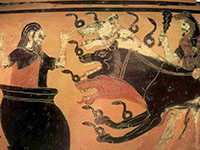 HUM 370-4-21: Monsters, Art, and Civilization
HUM 370-4-21: Monsters, Art, and Civilization
(ART HISTORY 319-0-1)
Ann Gunter (Art History, Classics, and Humanities)
TuTh 9:30 - 10:50 am
Fulfills Distro 4 (Historical Studies)
Griffins, sphinxes, and other fabulous creatures, along with imaginary animals, appear frequently in the art of ancient Egypt, Mesopotamia, and the Mediterranean world. They stand at the intersection of the normal and abnormal, the natural and unnatural. Why did these images become such favorite subjects for artistic representations, and what do they tell us about the cultures that produced them? Can we connect the invention of supernatural creatures composed from multiple species with key moments in human social and cognitive development, such as the emergence of urban society? Drawing on new perspectives from multiple disciplines, including art history, history, and archaeology, this course explores the phenomenon of the monstrous in ancient art.
HUM 370-4-30: Development of American Indian Law and Policy
(HISTORY 300-0-38 / AMER_ST 310-0-22 / LEGAL_ST 376-0-23)
Doug Kiel (History and Humanities)
MW 11:00 am - 12:20 pm
Fulfills Distro 4 (Historical Studies)
In this course, we will conceptualize Native peoples as nations, not merely racial/ethnic minorities. Students will learn about the unique legal landscape in Indian Country by charting the historical development of tribal governments and the ever-changing body of U.S. law and policy that regulates Indian affairs. We begin by studying Indigenous legal traditions, the European doctrine of discovery, and diplomatic relations between Native nations and European empires. We then shift our focus to treaty-making, the constitutional foundations of federal Indian law, 19th century U.S. Supreme Court decisions, and the growth of the federal bureaucracy in Indian Country. The course devotes considerable attention to the expansion of tribal governmental authority during the 20th century, the contemporary relationship between Indian tribes and the federal/state governments, and the role of federal Indian law as both a tool of U.S. colonial domination and a mechanism for protecting the interests of Indigenous communities.
 HUM 370-5-20: Introduction to Critical Food Studies
HUM 370-5-20: Introduction to Critical Food Studies
(HISTORY 392-0-36 / ANTHRO 390-0-22)
Hi'ilei Hobart (Native American and Indigenous Studies)
TuTh 9:30 - 10:50 am
Fulfills Distro 5 (Ethics and Values)
What counts as food? Recent debates over the social and environmental consequences of Genetically Modified Organisms (sometimes called ‘Frankenfoods’), media buzz over alternative proteins like crickets, and the mainstream popularity of veganism have provoked a critical return to questions of edibility, the agency of our food, and ecological responsibility – all of which challenge normative, Western orientations towards consumption practices. This course examines cultural constructions of appetite and nourishment by asking: What are the processes through which humans have come to view plants and animals as food? How is edibility either celebrated or refused across time, space, and bodies? And most importantly, how are specific worldviews mobilized in understanding human encounters with the things that we eat? Taking Donna Haraway’s landmark work “A Cyborg Manifesto” as a point of departure, cultural constructions of edibility will be explored by theorizing the food system as a vital, material force.
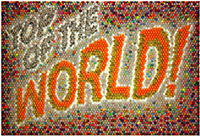 HUM 370-5-21: Reading Cosmopolitanism: Literature and "the World"
HUM 370-5-21: Reading Cosmopolitanism: Literature and "the World"
Rebecca Johnson (Middle East Studies, English, and Humanities)
TuTh 11:00 - 12:20 pm
Fulfills Distro 5 (Ethics and Values)
What does it mean to be in the world? This advanced seminar focuses on the philosophical idea of cosmopolitanism, or world citizenship, as it has appeared in literature from the eighteenth century to today, and proposes that we see the "world" itself as an imaginative category. Reading from the tradition of literary texts that have asked readers to picture not just a locality or a nation but a world, we will ask: who exists within the circle of sympathy that these works create, and what are the terms of inclusion/exclusion? Is being a citizen of the world the privilege of the few, or the burden of many? What is the relationship between understanding "the whole world" as one’s home, and other historical forms of global imagining that are less utopian, like empire, neoliberalism, and "the global war on terrorism?" Our study will begin with the formation of the European concept of cosmopolitanism in the eighteenth century and proceed through various counter-perspectives from non-Western literatures. When we are asked to imagine "the world," what—or whose—world is it?
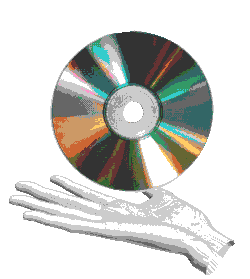 HUM 370-6-20: Art, Writing, Technology: New Approaches to the Digital Humanities
HUM 370-6-20: Art, Writing, Technology: New Approaches to the Digital Humanities(ENGL 311-0-20)
Danny Snelson (Digital Humanities and English)
TuTh 3:30 - 4:50 pm
Fulfills Distro 6 (Literature and Fine Arts)
In 1882, Friedrich Nietzsche used his typewriter to declare: “Our writing tools are also working on our thoughts.” How might we reconsider the history of art and literature in a time when our thoughts are being worked over by iPhones, YouTube, and Google? Can we rewrite this archive using tactics found in contemporary art and poetry? This class follows emerging trends in art and writing to construct new approaches to historical objects that are equally likely to appear on Soundcloud, in a PDF, through online videos, or even on Facebook. Studying the digital humanities alongside modes of contemporary art and letters, we’ll reimagine historical works through today’s emerging forms and formats. Through readings and class visits from artists and poets, we will explore works that translate established forms into a variety of new media formats. How might Twitter facilitate works of art? What does YouTube demand of poetry? Using a combination of seminar conversations and collaborative workshops, we’ll engage in a series of weekly experiments that attempt to reconfigure the history of art and literature through the filter of contemporary writing tools. No previous training in art, poetry, or new media is required.
HUM 370-6-21: Shakespeare: The Whole Journey
(ENGL 339-0-20)
Peter Erickson (Theatre and African American Studies)
MW 12:30 - 1:50 pm
Fulfills Distro 6 (Literature and Fine Arts)
The 20th century British poet and literary critic T. S. Eliot wrote that one “must know all of Shakespeare’s work in order to know any of it.” This course takes a journey along the whole of Shakespeare’s plays that will enable us to ask: what do we learn when we pursue this comprehensive perspective? As Eliot puts it, “The standard set by Shakespeare is that of a continuous development from first to last” that ultimately becomes a display of Shakespeare’s “power of development.” In various ways we will consider what generates this power and what role different genres at different moments may play in activating this ongoing process. What stories do we see when we imagine the Shakespeare corpus as incremental narratives? How does Shakespeare’s use of generic form change over time? How does the overall sequence of these changes create strikingly different endings and outcomes? List of plays we will explore: Titus Andronicus; The Merchant of Venice; As You Like It; Henry the Fifth; All’s Well That Ends Well; Othello; Antony and Cleopatra; The Winter’s Tale
Winter 2017 Undergraduate Humanities Courses
 HUM 260: Alternatives: Modeling Choice Across the Disciplines
HUM 260: Alternatives: Modeling Choice Across the Disciplines
(SLAVIC 396)
Gary Saul Morson (Slavic Languages and Literatures)
Morton Schapiro, President of Northwestern (Economics)
TuTh 12:30 – 1:50 pm
Fulfills Distro 5 (Ethics and Values), Distro 6 (Literature and Fine Arts), or Interdisciplinary Distro
This course offers a cross-disciplinary approach to the concept of alternatives and choices. At any given moment, how many alternatives are possible? Is there really such a thing as chance or choice? On what basis do we choose? How does our understanding of the past affect the future? Can we predict the future? Professor Gary Saul Morson, a specialist in literature, and Professor Morton Schapiro, a labor economist specializing in the economics of higher education, will themselves offer alternative approaches to these questions based on the presuppositions of their respective disciplines. If you enjoyed reading The Signal and the Noise and want to dig into topics and questions like uncertainty, prediction, modelling, and judgment, this class is the perfect complement. Enrollment is limited in this popular course; professors will select students by a 150-word essay application, due November 21 (new deadline). To secure your spot, please review last year's syllabus on Canvas, and compose a 150-word essay answering either: 1) How have your studies up until now prepared you for this course? Or 2) How do you expect this course to contribute to your ongoing studies? Application essays should be submitted in a Word or PDF document to humanities260@gmail.com by November 21st at 5pm. Please include your name, email and student ID number on your essay!
HUM 325-4-20: Digitizing Folk Music History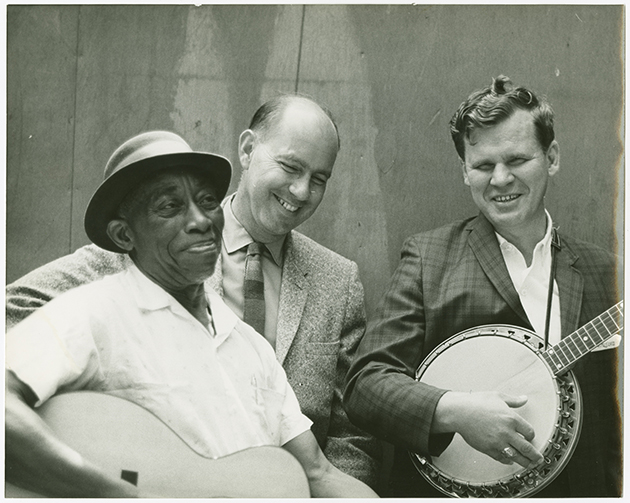
(HISTORY 395-0, AMER_ST 310-0)
Michael Kramer (History)
TuTh 3:30 - 4:50 pm
Fulfills Distro 4 (Historical Studies)
The United States folk music revival is typically thought of as an antimodern, even a Luddite, movement. Acoustic guitars, camp fires, overly sincere singers, and "Kumbaya" politics are the clichés many call to mind. To study it through digital means, however, reveals important connections between the history of the revival and issues of technology, culture, and poltiics in the modern world. In this research seminar, we examine the history of the US folk music revival through readings, audio listening, documentary films, seminar discussions, and, most of all, extensive digital analysis to investigate these connections. Working in platforms such as Omeka and WordPress, with tools ranging from Audacity sound editing software to mapping, annotation, and timeline programs, we use the archives of the Berkeley Folk Music Festival (in Northwestern's Special Collections), the Old Town School of Folk Music (in Chicago), and the Alan Lomax Collection (online) to probe what was at stake in the folk revival in relation to American culture and politics; questions of race, class, gender, age, and region; and the strange workings of music-making, memory, and power. As we do so, we ask how digital technologies might help us to interpret history more meaningfully; simultaneously, we explore how both the folk revival itself and the methods of historical study might be crucial to understanding our contemporary digital moment more effectively. Each student will be evaluated based on class participation, weekly digital mini-project experiments, presentations, and a final multimedia interpretive digital history podcast project that is the multimedia equivalent of a 15-20 page analytic essay based on original research.
 HUM 325-6-20: Print on Demand Poetry: Making Books After the Internet
HUM 325-6-20: Print on Demand Poetry: Making Books After the Internet
(ENGL 311-0)
Danny Snelson (Digital Humanities and English)
TuTh 3:30 - 4:50 pm
Fulfills Distro 6 (Literature and Fine Arts)
The alphabet rendered poetry obsolete, once and for all. Since the written word overtook the Homeric epic poem as a kind of communal Wikipedia, poetry has been less about communicating information and more about lyric expression. Recently, digital technologies have been seen to present this same challenge to the book. Like poetry, we might say that the book isn’t dead, it has simply lost its claim as the primary source of information. Over the last two decades, some of the most interesting works of art and poetry have turned to the book in both form and content, as both inspiration and fallen idol. It has never been easier for writers to publish, not just on Twitter and Facebook, but across a range of Print on Demand (POD) platforms for the printed book. This course examines recent works of poetry alongside new developments in print technologies. From Seth Siegelaub’s The Xerox Book (1968) to new works of POD poetry published throughout the quarter (TBA, 2017), we will study the emergence of innovative forms of writing the book under the influence of digital networks. Additionally, we will conduct our own experiments using print on demand in a series of collaborative and independent scholarly projects. No previous experience with either poetry or publishing is required. All students will publish books about poetry made on the internet.
 HUM 325-5-21: Technologies of Language
HUM 325-5-21: Technologies of Language
Jules Law (English)
TuTh 2 - 3:20 pm
Fulfills Distro 5 (Ethics and Values)
UPDATE (11/18/16): This course is now open to all--No prerequisite! The distro has also changed to Distro 5, Ethics and Values.
What if language were the true measuring stick of the world? What if the deep structure of the world itself were linguistic? What if syntax were the true nature of time? Grammar the underlying structure of logic? Our ideas of body and soul simply mirrors of the distinction between literal and metaphoric meaning? In this course we will survey some of the most important theories and philosophies of language from the last century, from Saussure to post-structuralism, with detours through Freud and Wittgenstein. At the heart of our inquiry will be the question of what it means to think of language as the technology that produces humans, and to think of the units of language as the units of the world. Finally, we will consider the most pressing issue facing language today: its digitization. How has the digitization of our cultural heritage changed the nature of the game? What is preserved and what is lost when an old book is “translated” to a digital archive? And are these problems and question continuous with ones that have always attended language, or are we confronting a profoundly new phenomenon here? For a final project in this class, students will each choose one book from the library’s Special Collections, and consider the technical and philosophic problems in converting that book in all its uniqueness and idiosyncrasies into a digital object.
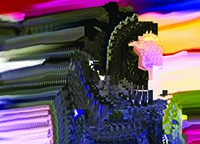 HUM 325-6-22: Digital Media Studies
HUM 325-6-22: Digital Media Studies
(ENGL 385-0)
Jim Hodge (English/Humanities)
MW 2 - 3:20 pm
Fulfills Distro 6 (Literature and Fine Arts)
Since their emergence in the World War II-era, digital technologies have been hailed as revolutionary agents of cultural transformation—for both good and ill. Charting a middle course between the breathless optimism of technophilia and the alarmism of technophobia, we will analyze digital computational technologies analytically and historically from a humanities perspective. We will pay particular attention to aesthetic forms responding to the problem of how digital media enable both unprecedented transparency and opacity: from dataveillance and sharing on social media to glitch art and the oddly impersonal dimensions of networked sexuality. Taking a comparative perspective, we will survey a series of digital aesthetic genres from videogames to video art to electronic literature.
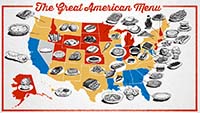 HUM 370-3-20: Eating the Other in America
HUM 370-3-20: Eating the Other in America
(AMER_ST 310-0, ANTHRO 390-0)
Hi'ilei Hobart (Postdoctoral Fellow in Native American and Indigenous Studies)
MW 9:30 - 10:50 am
Fulfills Distro 3 (Social and Behavioral Sciences)
Are we what we eat? 19th century French gastronome Jean Anthelme Brillat-Savarin famously stated as much in his Physiology of Taste (1825), but what does this mean within America’s increasingly globalized food system? The phrase “you are what you eat” suggests that the act of eating is one of entrenchment: food choices represent and intensify one’s own cultural and personal identity. But considering that issues of food access, obesity, and unfair or illegal food labor practices within the food system cut across race and class boundaries, this may now be an inaccurate – or at the very least – uncomfortable maxim. This course interrogates themes of identity, ethnicity, and nationalism by examining ‘American cuisine’ against the constraints of power and inequality in the US food system. We will focus on how national identity is constructed, affirmed, or refused through food choices by surveying foundational works within the field of food studies and connecting them to the pressing social issues of today, particularly as they manifest in the everyday activity of eating.
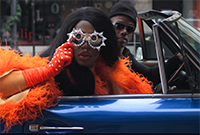 HUM 370-3-30: Queer New Media
HUM 370-3-30: Queer New Media
(COMM_ST 395-0, GNDR_ST 374-0)
Aymar Christian (Communication Studies)
TuTh 2 - 3:20 pm
Fulfills Distro 3 (Social and Behavioral Sciences)
How do sexuality, race, gender, and class shape new media? This course explores the role of intersectional identity in technological transformations in media, focusing on the transition from analog to digital. Students will read historical case studies and theoretical essays on such topics as how social media affect how queer users interact and self-identify, how race influences cable TV distribution, and how gender shaped early radio. The course is organized into three key areas of inquiry -- culture, organization, and technology -- with the goal of understanding the complex ways they interrelate.
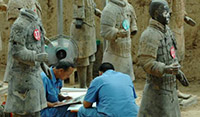 HUM 370-4-20: Archeology and Nationalism
HUM 370-4-20: Archeology and Nationalism
(ART_HIST 390-0, ANTHRO 390-0)
Ann Gunter (Art History/Humanities)
TuTh 11 am - 12:20 pm
Fulfills Distro 4 (Historical Studies)
Archaeology and nationalism have been closely intertwined at least since the idea of the nation-state emerged in the wake of the French Revolution. Archaeology offers nationalist agendas the possibility of filling in national historical records and extending the past into prehistory; its results can be displayed in museums or at entire sites, potentially reaching a new audience outside the written word. In turn, nationalism contributed significantly to the emergence of archaeology as a modern discipline. Drawing on new critical approaches and examples selected from a wide geographical range, this course explores the role of archaeology in the creation and elaboration of national identities. Issues include the institutionalization of archaeology; the development of museums and practices of display and interpretation; the creation of archaeological sites as national monuments and tourist destinations; cultural property legislation and repatriation of artifacts; and archaeology and monuments under totalitarian regimes.
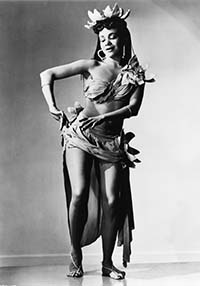 HUM 370-4-21: Hemispheric Moves: Dancing US-Latin American Relations Since 1898
HUM 370-4-21: Hemispheric Moves: Dancing US-Latin American Relations Since 1898
(DANCE 101-2, HISTORY 300-0, LATIN_AM 391-0)
Elizabeth Schwall (Andrew Mellon Postdoctoral Fellow in Dance Studies)
MW 9:30 to 10:50 am
Fulfills Distro 4 (Historical Studies)
This course examines the recent history of U.S.-Latin American relations through the lens of dance, starting with the 1898 U.S. intervention in the Cuban war of independence against Spain and moving through present day. This history has been filled with intimacy, fascination, and integration, on the one hand, and estrangement, exploitation, and misunderstanding, on the other. Dancing bodies both reflected and shaped the complex relationship between the United States and Latin America. Weekly readings include primary documents, secondary sources, and audiovisual materials featuring famous performers in grand theatres and films, social dancers in clubs, ethnographers moving among dancing faithful, frolicking Disney cartoons, and Latin American dancers in Chicago.
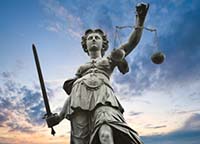 HUM 370-5-20: Religion and Politics Beyond Freedom and Violence
HUM 370-5-20: Religion and Politics Beyond Freedom and Violence
(POLI_SCI 390-0)
Elizabeth Shakman Hurd
TuTh 11 am - 12:20 p.m.
Fulfills Distro 5 (Ethics and Values)
This course considers the complex entanglements of religion with human life, law, politics and public culture in the US and abroad. Beginning with the debates over yoga, the public display of crèches in the United States, and the question of who is a Jew in the United Kingdom, we then move further afield to reflect on dilemmas involving law, politics and religious difference in other contexts. The course traverses disciplinary, geographic, and secular-religious boundaries, drawing on readings from politics, legal studies, religious studies, anthropology and popular culture. Students will also consider their own experiences of living with religious diversity, as we explore tools and strategies to think in new ways about the place of religion in the contemporary world.
Fall 2016 Undergraduate Humanities Courses
 HUM 225-0-20: Media Theory
HUM 225-0-20: Media Theory
(ART HISTORY 375 / COMM_ST 298-0-20)
Jim Hodge (English/Humanities)
MW 2:00 – 3:20 pm
Fulfills Distro 6 (Literature and Fine Arts)
How do media impact our sense of such fundamental concepts as personhood, social life, and time and space? How do new technologies transform sensory experience at different moments in history? This course provides an introduction to the field of theoretical writings within the humanities addressing the nature of media and the role of technology in twentieth- and twenty-first century culture. We will pay close attention to the work of key media theorists, including (but not limited to) Walter Benjamin, Marshall McLuhan, and Donna Haraway. We will also analyze works of art, sound, film, and literature in order to catalyze, test, and expand our sense of how media matter.
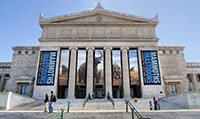 HUM 325-6-20: Ancient Rome in Chicago
HUM 325-6-20: Ancient Rome in Chicago
(CLASSICS 390-0-1)
Francesca Tataranni (Classics)
M 3:00 – 4:50 pm
W 3:00 – 4:20 pm
Fulfills Distro 6 (Literature and Fine Arts)
Ancient Rome is visible in Chicago — walk the city and learn to “read” the streets, buildings, and monuments that showcase Chicago’s engagement with the classical past! You’ll gain digital mapping and video editing skills as you collaborate on a virtual walking tour mapping Chicago’s ongoing dialogue with antiquity. With a combination of experiential learning and rigourous research methodologies, you’ll explore architecture, history, visual arts, and urban topography in this quintessential modern American city.
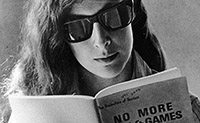 HUM 325-6-21: Cultural Criticism and the Contemporary Museum
HUM 325-6-21: Cultural Criticism and the Contemporary Museum
(HISTORY 393-0-22 / American Studies 310 / ART 372-0-22)
Michael Kramer (History)
TTh 3:30 – 4:50 pm
Fulfills Distro 4 (Historical Studies) or Distro 6 (Literature and Fine Arts)
What is the history of cultural and arts criticism in the United States? Where is it headed today? This course combines historical examination with fieldwork at the Museum of Contemporary Art in Chicago. Students will read extensively in the history of cultural criticism while experimenting with new, digital modes of writing, and engage in discussion of readings, films, artworks, digital projects, performances and educational events.
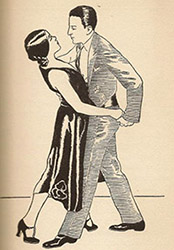 HUM 370-4-21: Dance, Race, and Nation in Latin America
HUM 370-4-21: Dance, Race, and Nation in Latin America
(HISTORY 300-0-26 / DANCE 335-0-20)
Elizabeth Schwall (Andrew Mellon Postdoctoral Fellow in Dance Studies)
TTh 12:30 to 1:50 pm
Fulfills Distro 4 (Historical Studies)
This course examines the histories of Latin American dances and their relationship to developing notions of race and nation in the region. We’ll study the historical emergence and transformation of “indigeneity,” “blackness,” and “whiteness,” and consider how dance practices became associated with these identifications. We’ll also trace dance developments in relation to nation-state formation and social stratification.
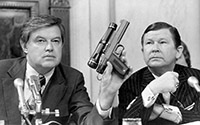 HUM 370-4-22: Extreme Makeover: The End of Consensus and the Rise of Extreme Politics in 1970s Washington
HUM 370-4-22: Extreme Makeover: The End of Consensus and the Rise of Extreme Politics in 1970s Washington
(HISTORY 392-0-32)
Michael Allen (History)
MW 3:30 – 4:50 pm
Fulfills Distro 4 (Historical Studies)
This course will consider the causes and consequences of the end of the Cold War consensus in American life between the defeat of Lyndon Johnson in 1968 and the election of Ronald Reagan in 1980. We will focus on ways that this era of the "long 1970s" saw the end of political consensus and the emergence of a newly hyper-partisan politics that has defined U.S. politics ever since.
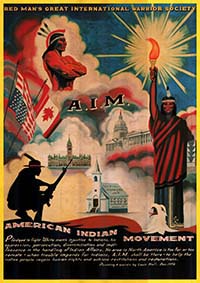 HUM 370-4-23: Introduction to Native American History
HUM 370-4-23: Introduction to Native American History
(HISTORY 200-0-22 / AMERICAN STUDIES 310-21)
Doug Kiel (History/Humanities)
TTh 2:00 – 3:20 pm
Fulfills Distro 4 (Historical Studies)
Long ignored and romanticized, Native American history has become a vibrant area of study rich with new scholarship. This course will grapple with the most important issues currently driving inquiry within the field. We will investigate pivotal developments in Native American history and build a foundation for future coursework. Course topics will include: the new worlds that Natives and various newcomers created, competing visions for what is now known as the United States, tribal sovereignty, federal Indian policy, notions of authenticity, structures of settler colonialism, resistance movements, Indigenous governance, cultural revitalization, conflict over natural resources, and urban experiences. We will also examine how stories about the Indigenous past have been politicized, and how Indigenous histories can reshape our broader understandings of American history and culture.
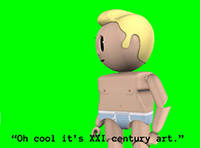 HUM 370-6-20: New Media Art
HUM 370-6-20: New Media Art
(ART HISTORY 390-0)
Jim Hodge (English/Humanities)
MW 9:30 – 10:50 am
Fulfills Distro 6 (Literature and Fine Arts)
This course considers Western art and artistic practices employing digital computational technologies from the room-sized mainframe computer to today’s mobile and ubiquitous media. We will explore emergent genres (net.art, glitch art, interactive art, bio art) to gauge the ways in which digital media changes—and has failed to change—contemporary art and culture. Topics include new media art’s vexed relation to the art world; networks and networked sociality; sexuality and digital art; and the changing meanings of abstraction and figuration.
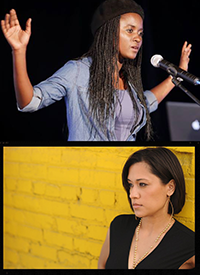 HUM 395-0-20: The Poetics of Engagement: Global/Local Poetry in Conversation
HUM 395-0-20: The Poetics of Engagement: Global/Local Poetry in Conversation
(ENGLISH 311_0_1 / COMP_LIT 390-0-20)
Susannah Gottlieb (English/Comparative Literature) and Chris Abani (English)
M 2:00 – 4:50 pm
Fulfills Distro 6 (Literature and Fine Arts)
From the theoretical study of poetics, to the practice of writing poems, to local community engagement, this class will build critical and creative conversations about poetry as we explore poetic traditions from Africa, Europe, the Arab World, Israel, and the U.S. (including hip-hop). We will work with two visiting poets (TJ Dema from Botswana and Mayda Del Valle from Chicago) both in class and in the field as they teach workshops beyond the walls of the university.
